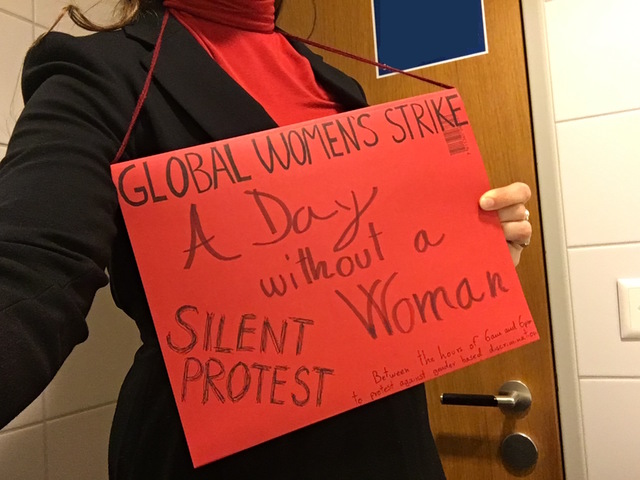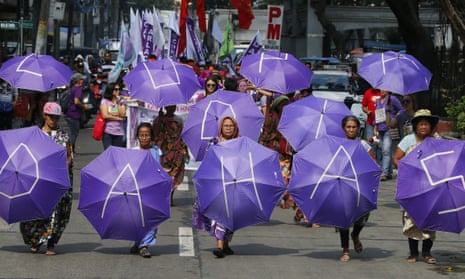Chirlane McCray, the first lady of New York City, marks International Women’s Day:
International Women's Day 2017: protests, activism and a strike – as it happened
Live global coverage of International Women’s Day 2017 as events took place around the world to mark the ongoing fight for equality
Wed 8 Mar 2017 22.59 EST
First published on Tue 7 Mar 2017 16.33 EST- Closing summary
- Images of IWD around the world
- IWD in Nigeria
- The Obamas mark IWD
- IWD in Argentina
- IWD in Turkey
- The Fearless Girl
- More scenes from IWD in the Americas
- Falling short of feminist goals in Canada
- IWD in Mexico City
- Snapchat celebrates IWD with a light-skinned Frida Kahlo, a sexy Marie Curie
- The wage gap in the US
- IWD in Brazil
- Protests in Poland
- White House statement on IWD
- US House Dems walkout on International Women's Day
- Watch: Why is society so frightened of women without children?
- The world's gender gap is on track to close…in 169 years
- "A Day Without a Woman," explained.
- Outrage spreads over viral video of a teacher describing domestic abuse
- See photos from celebrations of International Women's Day around the world
- "Guerilla art" on Wall Street calls for more women on corporate boards
- Thousands in Dublin protest the criminalization of abortion
- IWD in Argentina
- In the US, Women Democrats in the House will stage a walkout
- Call for more statues to celebrate women in the UK
- IWD in Italy
- Protesters arrest in Russia: reports
- More funding for UK domestic violence services
- IWD in Germany
- IWD in Spain
- IWD in the Asia Pacific region
- Woman dies in Wolverhampton, UK
- Donald Trump tweets to mark IWD
- IWD in Poland
- Women across the globe: #BeBoldForChange
- IWD in Spain
- IWD in Germany
- IWD in France
- Putin wishes Russian women 'Happy Women's Day'
- Sexist Polish lawmaker to be punished
- IWD in the Middle East
- Iceland becomes first country to require proof of equal pay
- IWD in UK parliament
- Wikipedia honours women for IWD
- A day without women?
- So, when's International Men's Day?
- Do women's strikes work?
- IWD in Greece
- IWD in Afghanistan
- Australia's childcare workers strike
- IWD in Myanmar
- IWD in Pakistan
- IWD in Canberra – and Kenya
- IWD in South Korea
- IWD in India
- IWD in Japan
- IWD in Indonesia
- IWD in Papua New Guinea
- IWD in China
- How Australian media covers IWD
- Welcome
Live feed
- Closing summary
- Images of IWD around the world
- IWD in Nigeria
- The Obamas mark IWD
- IWD in Argentina
- IWD in Turkey
- The Fearless Girl
- More scenes from IWD in the Americas
- Falling short of feminist goals in Canada
- IWD in Mexico City
- Snapchat celebrates IWD with a light-skinned Frida Kahlo, a sexy Marie Curie
- The wage gap in the US
- IWD in Brazil
- Protests in Poland
- White House statement on IWD
- US House Dems walkout on International Women's Day
- Watch: Why is society so frightened of women without children?
- The world's gender gap is on track to close…in 169 years
- "A Day Without a Woman," explained.
- Outrage spreads over viral video of a teacher describing domestic abuse
- See photos from celebrations of International Women's Day around the world
- "Guerilla art" on Wall Street calls for more women on corporate boards
- Thousands in Dublin protest the criminalization of abortion
- IWD in Argentina
- In the US, Women Democrats in the House will stage a walkout
- Call for more statues to celebrate women in the UK
- IWD in Italy
- Protesters arrest in Russia: reports
- More funding for UK domestic violence services
- IWD in Germany
- IWD in Spain
- IWD in the Asia Pacific region
- Woman dies in Wolverhampton, UK
- Donald Trump tweets to mark IWD
- IWD in Poland
- Women across the globe: #BeBoldForChange
- IWD in Spain
- IWD in Germany
- IWD in France
- Putin wishes Russian women 'Happy Women's Day'
- Sexist Polish lawmaker to be punished
- IWD in the Middle East
- Iceland becomes first country to require proof of equal pay
- IWD in UK parliament
- Wikipedia honours women for IWD
- A day without women?
- So, when's International Men's Day?
- Do women's strikes work?
- IWD in Greece
- IWD in Afghanistan
- Australia's childcare workers strike
- IWD in Myanmar
- IWD in Pakistan
- IWD in Canberra – and Kenya
- IWD in South Korea
- IWD in India
- IWD in Japan
- IWD in Indonesia
- IWD in Papua New Guinea
- IWD in China
- How Australian media covers IWD
- Welcome
In the US, Michael Bennett of the NFL’s Seattle Seahawks pledged his “unconditional solidarity with the women’s strike on International Women’s Day”:
As a black man in America, I sometimes get overwhelmed and discouraged by what I see — from the police killings of unarmed black men, to the unequal educational system, to the mass incarceration of poor people of color in for-profit prisons. But when I look in my daughters’ eyes, I see the courage of Harriet Tubman, the patience of Rosa Parks, the soul of Ida B. Wells, the passion of Fannie Lou Hamer and the heart of Angela Davis. I see the future. I see hope. And I’m inspired because it will be women who lead the future. That is why I am writing to express my unconditional solidarity with the women’s strike on International Women’s Day, March 8.
It would be easy for me to say that I am supporting this day of resistance because I have three daughters and I want nothing to stand in their way as they attempt to achieve their goals. I could also say that I am doing this because my wife, Pele — my best friend and soulmate — is of Samoan descent and has lived the struggle of being a woman and the daughter of immigrants. But this issue is a lot bigger than my dreams for my own family. It’s about the women across the earth who are suffering: women who are less worried about a glass ceiling than they are about a collapsing floor. It’s about women of color across the earth who live on less than one dollar a day. It’s about all women who are subject to sexual assault and violence.
Read more at the Players’ Tribune.
Worldwide, the gender gap – which includes employment, education, and earnings – actually got worse in 2016, according to the World Economic Forum’s Global Gender Gap Report. But Toyin Saraki wrote in December that the long-term trend is toward parity:
A reminder that while the status quo is unacceptable, the longer-term trend is pointed towards gender equality. And this trend is global, not simply confined to the western world. Just look at healthcare. Maternal mortality remains a mass killer in the developing world. It may not be as newsworthy as gender-based violence or as stark and immediate as disease or starvation, but it is the second biggest killer of women of reproductive age in the developing world. This is changing.
Due to a concerted focus not least through the recently concluded UN Millennium Development Goals, the amount of women dying in childbirth has fallen by 45% since 1990. A staggering achievement. Gender-based development campaigns aimed at educating women have also pushed aside outmoded approaches to pregnancy and family planning, empowering women to take control of their own welfare in one of the most vulnerable periods of their lives.
Improvement is also being made in education. While secondary education remains a critical problem in many developing countries, the challenge of primary school enrolment has virtually been solved. Enrolment rates globally are now on a near parity between boys and girls.
And what of the workplace? The top-line figures may be bleak, but there is evidence to suggest slow change is happening. A study of 70 countries, including many in the developing world, showed that since 1995 the gender wage gap has narrowed from 28% to 20%. The gap is still far too big. But it is falling.
Watch: Why is society so frightened of women without children?
The proportion of women not having children before the menopause has reached a record high in the last decade. In this video, women from the UK, France and Spain discuss the taboo of childlessness that they say comes from a dated societal structure, and mark International Women’s Day by spotlighting female identity beyond motherhood.
The tiny Balkan state of Montenegro saw hundreds protest state cuts to maternal aid. The AP reports:
Showing support on the International Women’s Day, hundreds have joined a protest by women in tiny Montenegro against cuts in state aid for mothers of three or more children.
Financial help for some 21,500 women in Montenegro - a country of 620,000 people - has been slashed by 25 percent amid efforts to tighten public spending. About half of the women on the list are jobless.
Montenegrin women have been protesting for days demanding that the government decision be reversed. Protesters on Wednesday blocked traffic outside the parliament building in downtown Podgorica, the capital, shouting “thieves.”
Montenegro’s economy has been weak despite recent progress in the Balkan country’s efforts at joining NATO and the European Union.
The world's gender gap is on track to close…in 169 years

The European Parliament’s Greek vice president, Dimitris Papadimoulis, greeted International Women’s Day with a shocking forecast from the World Economic Forum.
“The World Economic Forum predicts that the gender gap won’t close entirely until 2186,” Papadimoulis told the parliament in a speech replayed on Greek media. “Yes, you heard well, until 2186. Only in 169 years! It is more than obvious that we have to speed up this process. We have to act now.”
Greek women have suffered the country’s ongoing economic crisis disproportionately. Although seven years of economic meltdown have narrowed a gap in the employment rate between men and women – because of soaring unemployment rates among men, not an increase in the hiring of women – Greece’s employment gender gap remains well above the European Union average. In 2015, the gap was 18 percentage points in Greece, compared with 11 across the rest of the EU.
In a Facebook post to mark International Women’s Day, Alexis Tsipras, Greece’s leftist prime minister and leader of the Syriza political party, hailed the women worldwide who “battle for equality, justice and dignity.” He singled out Nadia Murrad, a former ISIS sex slave who is now a Goodwill Ambassador for the United Nations.
"A Day Without a Woman," explained.
Women from more than 40 countries are staging a strike from all work, paid and unpaid, to highlight women’s power within global economies. But what if you can’t join them? Here are other ways you can show solidarity, from wearing red to avoiding the shops for the day.

A Guardian reader shares her International Women’s Day protest from Switzerland:

One participant in Zurich
Editorial note: This has been uploaded on behalf of Bene In Zurich there was no formal strike organised, so I joined the International Women’s Strike by partaking in a silent protest. I couldn't pass on the chance of standing up for what is right especially, in a movement that is taking part across so many countries. Instead of outright striking and not showing up to work, I am protesting through silence to raise awareness of gender-based inequalities. My protest started at 6am and I will not speak again until 6pm. I came to work wearing the sign in the picture. I work in a male dominated field, so this has been attracting a lot of attention which is good, but also incredibly scary. So far people have mostly ignored the huge sign hanging from my neck, but if anybody starts reading it, I hand them out a card with a short list of reasons to explain why I'm doing this. Sometimes I am met with ridicule, but even then people want to engage and discuss. A couple of times there has been heartfelt support and admitarion. It's been hard and I have 5 more hours to go, but maybe, if we all keep at this, one day there will be progress.
Outrage spreads over viral video of a teacher describing domestic abuse
On the eve of International Women’s Day, a viral video of a teacher appearing to brag to his class about domestic abuse illustrated just how pervasive Mexico’s machismo culture remains.
The footage showed Ramón Urrea Bernal, a teacher at a public high school in Guadalajara, affirming that if his wife didn’t consent to sex he’d “grab her by the hair, give her a fucking beating [and say] ‘Hey stupid, if you don’t know how to do anything else at least open your legs.’”
The coarse, 90-second rant concluded with Urrea declaring that he’d throw his wife and children out on the street if she denied him sex. It served as a stark reminder of how many in Mexico are exposed to misogyny from an early age.
As outrage spread across social media yesterday, the university that runs the school said Urrea would face administrative procedures. Urrea apologised for his language but claimed he was merely acting out an “example of domestic violence” to highlight the problem.
“How dare he say these things when he’s supposed to educate people? How are his pupils going to treat women with teachers like him?” asked Karla, a 15-year-old student from the school. “Instead of leading by example he does the opposite. He’s encouraging others to think like he does,” added Giselle, another schoolgirl.
“It’s very worrying. These messages are reinforced everywhere in Mexico, in television, religion, the family and now even in schools,” said Sofía Virgen, a local representative of the Latin American and Caribbean Committee for the Defence of Women’s Rights. “This creates the culture of machismo that results in people committing femicides.”
See photos from celebrations of International Women's Day around the world
Thousands worldwide gathered to protest the conditions for their countries’ women.
In Manila, the capital of the Philippines, protesters urged President Rodrigo Duterte to address the pressing problems of lack of food, jobs and peace instead of killings and violence.

In Melbourne, Australia, thousands called for decolonization, and end to racism, economic justice for all women, and reproductive rights.

See more.








Comments (…)
Sign in or create your Guardian account to join the discussion